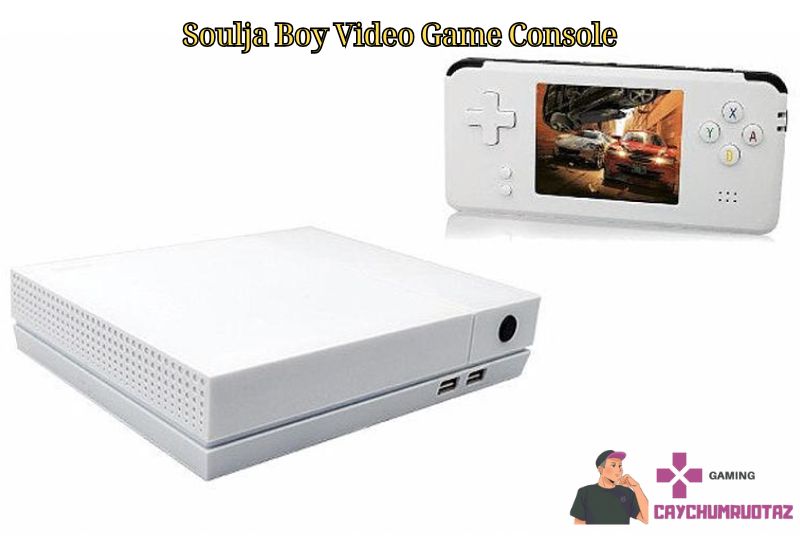Santa Fake Call
Published on October 20, 2024

The gaming industry has seen many surprising entries, but few have caused as much of a stir as Soulja Boy’s venture into video game consoles. Known for his rap career and viral hits like “Crank That (Soulja Boy),” the artist shocked fans and tech enthusiasts when he announced his own line of gaming consoles. In this article, Caychumruotaz.com will dive into the story of Soulja Boy Video Game Console, its features, controversies, and how it fits into the broader gaming landscape.
Soulja Boy, whose real name is DeAndre Cortez Way, has always been an entrepreneur at heart. From music to clothing lines, he’s no stranger to taking risks. In late 2018, he surprised the gaming community by announcing the SouljaGame Console and the SouljaGame Handheld. These devices were marketed as affordable alternatives to mainstream gaming systems, boasting an extensive library of games.
The SouljaGame Console and Handheld were marketed as multi-functional devices capable of playing retro games from consoles like the NES, SNES, Sega Genesis, and PlayStation. They claimed to offer thousands of built-in games, appealing to retro gaming enthusiasts and casual players looking for a budget-friendly option.
While the idea of a celebrity entering the gaming market was exciting, the launch of the SouljaGame consoles quickly became mired in controversy.
One of the most significant issues was that the consoles appeared to be rebranded versions of existing emulation devices, many of which contained pirated games. This led to allegations that Soulja Boy was profiting from unauthorized content.
Nintendo, a company known for fiercely protecting its intellectual property, reportedly took issue with the inclusion of its games on the consoles. The threat of legal action forced Soulja Boy to pull the consoles from his website just weeks after their release.
Many buyers accused the consoles of being low-quality and falsely advertised. Complaints about clunky interfaces, poor build quality, and misleading marketing tarnished the consoles’ reputation further.
Despite the controversy, Soulja Boy remained defiant, defending his venture on social media. He claimed that the consoles were legitimate and part of his broader effort to diversify his brand. However, the backlash and legal pressures eventually led to the discontinuation of the SouljaGame lineup.
The story of the SouljaGame console serves as a fascinating case study in entrepreneurship, intellectual property, and the gaming industry.
One of the biggest criticisms of the SouljaGame consoles was their lack of innovation. By relying on existing emulation devices, the product failed to stand out in a crowded market.
Soulja Boy’s venture highlighted the importance of respecting intellectual property laws. The inclusion of pirated games not only damaged his brand but also exposed him to legal risks.
While the consoles faced criticism, Soulja Boy’s celebrity status helped them gain attention in a way that many other small-scale gaming devices never could. This underscores the influence of branding and marketing.
Today, the Soulja Boy Video Game Console is remembered more for its controversies than its contributions to gaming. However, it remains a unique chapter in the industry, showcasing how a bold idea can capture public attention, even if it falls short in execution.
Given Soulja Boy’s entrepreneurial spirit, it wouldn’t be surprising to see him revisit the gaming world. If he does, lessons from the SouljaGame console could guide him to a more successful venture.
The gaming industry has seen a surge in interest from celebrities in recent years, with many high-profile figures entering the scene through investments, collaborations, and even creating their own gaming products. Soulja Boy’s Video Game Console is one of the most notable examples, but he’s far from the only celebrity to venture into this space. Artists like Snoop Dogg, Post Malone, and many others have shown a deep connection to gaming, further solidifying the industry’s cultural importance and expanding its appeal across different demographics.
Snoop Dogg has long been a passionate gamer, frequently showcasing his love for gaming on social media and in interviews. He has made notable moves in the industry, including collaborating with gaming companies for promotions, hosting gaming streams on platforms like Twitch, and even launching his own branded in-game content. His presence in gaming has helped bridge the gap between hip-hop culture and the gaming community, attracting a diverse audience to both his music and gaming ventures.
Post Malone, known for his chart-topping hits and gaming enthusiasm, has also tapped into the gaming world. He has collaborated with gaming companies, including a partnership with World of Warcraft, where he even played the game live for his fans. His influence and love for gaming have allowed him to connect with a younger, tech-savvy audience that shares his interest in video games. Post Malone has also hosted charity gaming events, further solidifying his impact on the gaming community.
The increasing involvement of celebrities like Snoop Dogg and Post Malone reflects the growing cultural significance of gaming as a form of entertainment. Gaming is no longer just a pastime for a specific group—it’s a multi-billion dollar industry that attracts people from all walks of life, including influential figures from music, sports, and film. This trend has led to gaming becoming more inclusive, bringing together people from diverse backgrounds and creating new opportunities for collaboration and innovation.
With celebrities continuing to invest in and collaborate with gaming companies, it’s clear that gaming is more than just a hobby—it’s a powerful cultural force that connects fans, brands, and celebrities alike.
The Soulja Boy Video Game Console may not have revolutionized the gaming industry, but it left a lasting impression as a bold and unconventional venture. Its story serves as a reminder of the challenges and opportunities in entrepreneurship, particularly in an industry as complex as gaming.